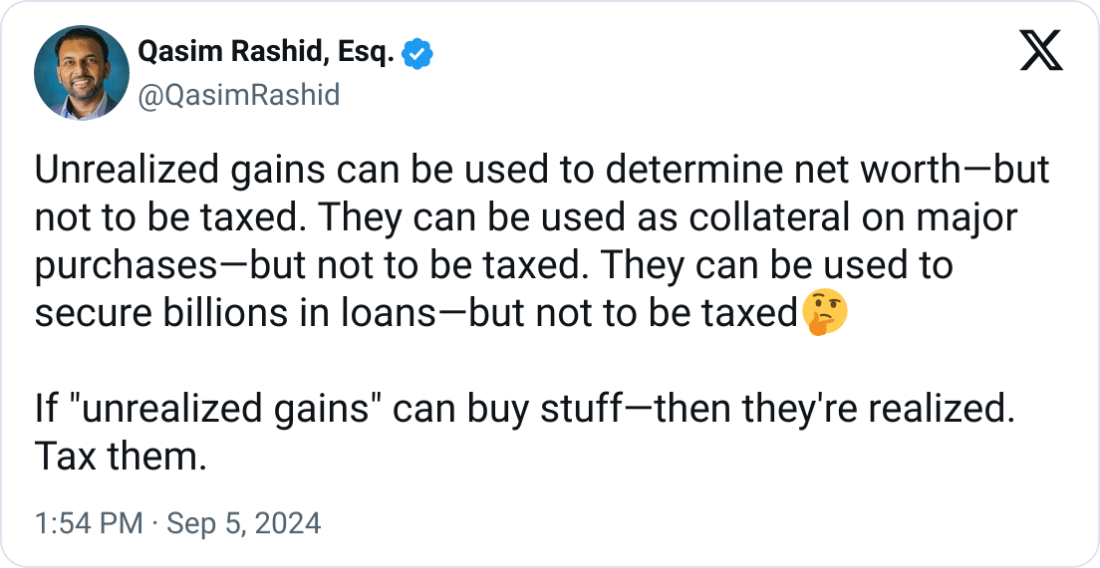this post was submitted on 19 Sep 2024
1600 points (96.8% liked)
Microblog Memes
6016 readers
1545 users here now
A place to share screenshots of Microblog posts, whether from Mastodon, tumblr, ~~Twitter~~ X, KBin, Threads or elsewhere.
Created as an evolution of White People Twitter and other tweet-capture subreddits.
Rules:
- Please put at least one word relevant to the post in the post title.
- Be nice.
- No advertising, brand promotion or guerilla marketing.
- Posters are encouraged to link to the toot or tweet etc in the description of posts.
Related communities:
founded 1 year ago
MODERATORS
you are viewing a single comment's thread
view the rest of the comments
view the rest of the comments

Both my examples are about being taxed on money that may never exist. Your second comment makes me think you did not understand me.
I am not talking about political impossibility. And I am certainly not talking about the difficulty in calculating current market value. I am talking about the poor correlation between current value and the gains that will potentially actually be “realized”. I am talking about bad policy.
Here is an example. Back in the 2000’s, there were people that were taxed on the value of their stock options using exactly this same logic ( the “value” on paper ). Later, when the market crashed, there was not even enough value left in the shares and options to pay the taxes already owing. People literally paid well over 100% tax ( in some cases hundreds of percent ). Who were these super rich people that deserved such tax treatment? Many were relatively young employees of technology companies using equity as compensation. These employees had little wealth before being taxed on their “unrealized gains” and may have been bankrupt after. The whole concept is incredibly flawed.
I personally dislike Elon Musk. But even with him, taxing him on what he was worth at the high point would be totally unjust as he is not worth that now. It makes way more sense ( in my view ) to tax him when, and if, any of that wealth materializes. I am no fan of Donald Trump. But I think it would have been totally insane to tax him on the value of his Trump Media “wealth” when it was “valued” at $8 billion. If he gets even $1 billion out of it I will be amazed. Anyway, tax him on that. Tax it at 90% if you want. But don’t tax him on “wealth” that nobody is ever going to see.
I do not know what state you are in but I am unaware of anywhere that would tax you on “unrealized” income from your high-tax bracket salary. Nobody is taxing you on the “unrealized” benefit of your salary. Are you trying to tell me that it does? Where I am, leaving the jurisdiction for more than 6 months would render my income and gains beyond that point non-taxable so the government of course wants a “final return”. Are you talking about something similar?
Again, I am all for taxing the rich. Tax actual gains however you want. What I do not think you should do is tax “unrealized” gains. It is an incredibly flawed idea.
That wealth "materializes" when his company gets a new loan based on the paper value of his assets as collateral, even if he hasn't materially realized that value yet. If you can get rewarded with new loans and government contracts based on paper valuations, you can pay taxes based on paper valuations.
This is the thing, I think. We’re talking about unrealized gains, but I think the definition of the phrase hasn’t kept up with the practical application. If the unrealized wealth is providing tangible value, e.g. as collateral for a loan, is it “unrealized?” Seems pretty obvious it’s very realized and should be taxed as such.
I was talking about withholding, where I pay taxes that will never come due. On reflection maybe isn't a perfect analogy.
You haven't made a persuasive argument (or any argument really) against, you just keep insisting it's a bad idea.
One thing that stands out is you keep referring to "money that may never exist". That's not how tax works. You are taxed on the basis of your income, which is often but not always monetary. This is both intuitive and consistent with existing tax code. If you don't like it you have a much bigger problem than objecting to taxing unrealized cap gains.